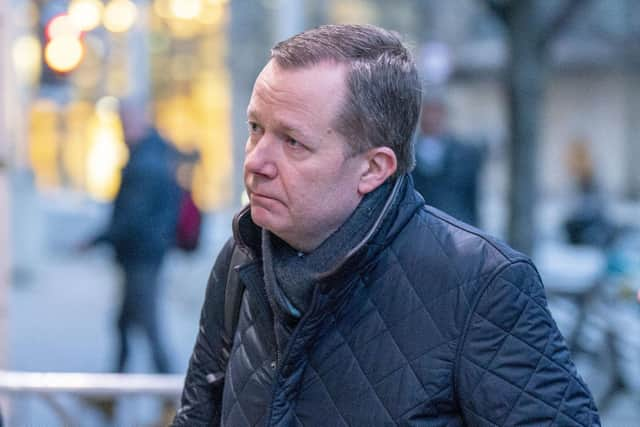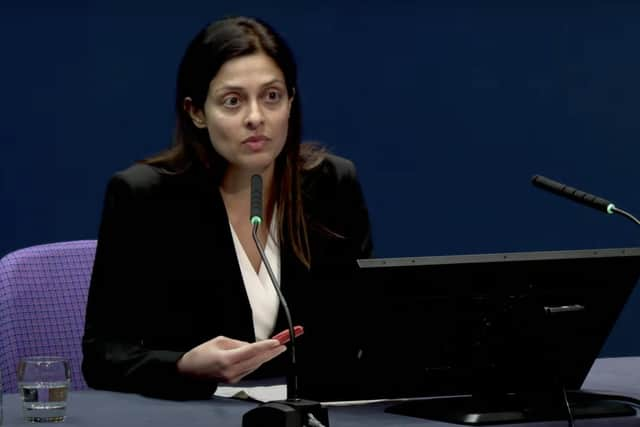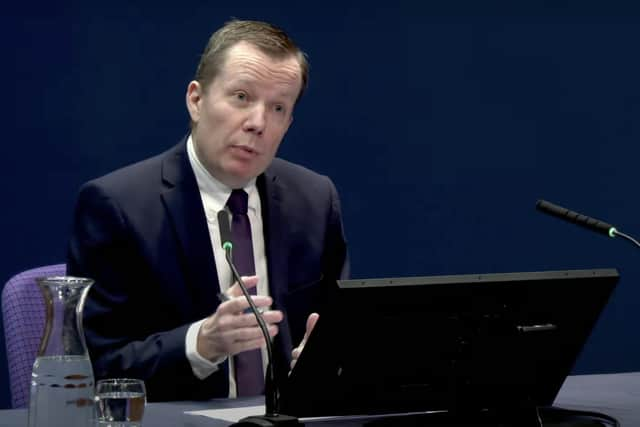UK Covid Inquiry: Jason Leitch oversaw 'Star Chamber' WhatsApp group that automatically deleted messages
Professor Jason Leitch has defended deleting WhatsApp messages throughout the pandemic, as Scotland’s senior clinical adviser denied advising Humza Yousaf of a “work-around” to mask rules on a telling day of evidence at the UK Covid Inquiry.
The national clinical director insisted he was just following Scottish Government guidance as he admitted to deleting WhatsApp messages, disagreeing the Government’s message retention policies meant he should have retained those posts.
Advertisement
Hide AdAdvertisement
Hide AdHe was also challenged on a WhatsApp exchange from November 2021 in which Mr Yousaf – then serving as health secretary – asked Prof Leitch about masking rules ahead of an event he was attending.


Prof Leitch told the now First Minister "literally no-one" followed official guidance about wearing a mask when not seated at dinner, and suggested “lift your drink” to “comply” with the rules.
Last week, a message from Prof Leitch was shown to the inquiry in which he said deleting WhatsApp messages was a “bed-time ritual” – a comment the government’s senior clinical adviser has now described as “a flippant exaggeration”.
The evidence sparked a coruscating responses from the Scottish Covid Bereaved group and Scottish Labour, who demanded to know how Prof Leitch was “still in a job” and called for him to be sacked.
The attitudes of other public servants towards the retention of government communications were also examined, as the inquiry heard former first minister Nicola Sturgeon told Edinburgh University academic Professor Devi Sridhar "don’t worry about protocol”, and to instead use her private SNP email address for government business.


It was revealed Scotland's chief medical officer Sir Gregor Smith, Prof Leitch, and chair of the national incident management team, Dr Jim McMenamin, were all part of a WhatsApp group called ‘Star Chamber’ that discussed which local authorities should be placed into lockdown.
The Star Chamber was historicall an English court that sat in the 16th century and has since become a byword for an authority that delivers arbitrary rulings behind closed doors, with little to no due process.
Prof Leitch told the inquiry the group was used by Dr McMenamin to reach "clinical consensus" before chairing Scotland’s national incident management team. He also explained the tiers were decided by data, such as deaths and infections, and whether the figures for local authorities met certain criteria.
Advertisement
Hide AdAdvertisement
Hide AdThe inquiry heard Prof Leitch set up an ‘auto-delete’ function on the Star Chamber WhatsApp group.


“I am comfortable that falls within Scottish Government guidance,” Prof Leitch said, before adding that he deleted messages “in line” with that government guidance.
Jamie Dawson KC, the lead counsel to the UK Covid Inquiry, put it to Prof Leitch that his “interpretation of the guidance is wrong” and that “in fact one needs to retain discussions salient to the business of [the] Scottish Government”.
Prof Leitch replied: “I disagree with your interpretation of the guidance.”
Mr Dawson KC read out a statement from Mr Leitch in which he said: “Except for direct messages from my Twitter account, I have not retained any one-to-one informal communications in relation to the management of the pandemic in Scotland, this is because I followed the policy described in more detail above.”
The KC then asked: “So, you used text messages, WhatsApp messages, is that right? But you did not retain them above and beyond the interpretation of the policy that you’ve just set out for us?”
Mr Leitch replied: “Correct.”
Towards the end of the session, the chair of the inquiry, Baroness Hallett, asked to question Prof Leitch herself.
“Some of the messages I’ve read reflect a rather enthusiastic adoption of the policy of deletion of messages,” Baroness Hallett said. “There also might be a suggestion that some of the people wanted to delete messages to avoid the messages being the subject of a Freedom of Information request. That would be wrong, wouldn’t it?”
Advertisement
Hide AdAdvertisement
Hide AdProf Leitch agreed, and said that was not his intention, nor did he suggest others do that.
The clinical director’s statements follow reports last year that senior government officials deleted messages relating to the pandemic regularly and could not hand them to the inquiry.
Ms Sturgeon and her deputy John Swinney were also revealed not to have retained messages, although the former first minister said in a statement at the weekend correspondence had been given to the inquiry after being saved by recipients.
Ms Sturgeon spoke a number of times with Prof Sridhar through the course of the pandemic over direct messages on X, formerly Twitter, the inquiry heard during the academic’s Sridhar’s evidence.
In an exchange between the two in June 2020, Prof Sridhar – one of the country’s leading experts and most public academics during the pandemic – said she had prepared a note for the chief medical officer on “key steps to managing the outbreak in Scotland looking forward”.
She said she was “happy to share a draft”, but was unaware if that would “overstep or break protocol”.
Responding, Ms Sturgeon said: “That would be helpful. (Don’t worry about protocol – tackling the virus more important than that and I’ll handle any issues on that front).”
She went on to tell the academic to send the information to her “privately”, providing an SNP email address or “officially” using her government email address. “Either way fine by me,” she added, in the screenshot of the message Prof Sridhar provided to the inquiry.
Advertisement
Hide AdAdvertisement
Hide Ad